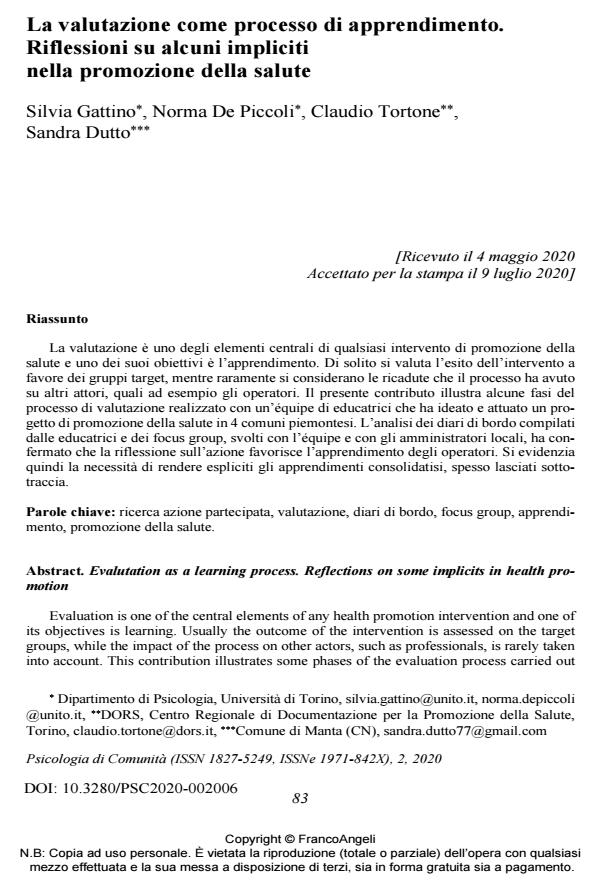Evalutation as a learning process. Reflections on some implicits in health promotion
Journal title PSICOLOGIA DI COMUNITA’
Author/s Silvia Gattino, Norma De Piccoli, Claudio Tortone, Sandra Dutto
Publishing Year 2020 Issue 2020/2 Language Italian
Pages 18 P. 83-100 File size 305 KB
DOI 10.3280/PSC2020-002006
DOI is like a bar code for intellectual property: to have more infomation
click here
Below, you can see the article first page
If you want to buy this article in PDF format, you can do it, following the instructions to buy download credits

FrancoAngeli is member of Publishers International Linking Association, Inc (PILA), a not-for-profit association which run the CrossRef service enabling links to and from online scholarly content.
Evaluation is one of the central elements of any health promotion intervention and one of its objectives is learning. Usually the outcome of the intervention is assessed on the target groups, while the impact of the process on other actors, such as professionals, is rarely taken into account. This contribution illustrates some phases of the evaluation process carried out with a team of professional educators who designed and implemented a health promotion pro-ject in 4 Piedmont municipalities. The analysis of the logbooks filled in by the professional educators, and the focus groups carried out with this team and the local administrators, con-firmed that the thinking about the action fosters the learning of the professionals. It is therefore necessary to make explicit the consolidated learning, often left under-track.
Keywords: Participated action research, evaluation, logbooks, focus group, learning, health promotion.
- Arcidiacono, C., & Marta, E. (2008). La ricerca in psicologia di comunità: conoscenza, finalità trasformative e partecipazione. Psicologia di Comunità, 2(19), 9-27. DOI: 10.3280/PSC2008-002002
- Argyris, C., Putnam, R., & McClain Smith, D. (1985). Action Science. San Francisco: Jossey-Bass.
- Contu, P. (2014). La promozione della salute in Europa: alcuni obiettivi e strumenti per una migliore organizzazione, La Rivista Italiana di Educazione Sanitaria, 58(2), 178-182.
- Coppo, A., Gattino, S., Faggiano, F., Gilardi, L., Capra, P., Tortone, C., …& De Piccoli, N. (2020). Psychosocial empowerment-based interventions for smoking reduction: Concepts, measures and outcomes. A systematic review. Global Health Promotion. DOI: 10.1177/175797592092940
- De Piccoli, N. (2008). Tra il dire e il fare. Una analisi prospettica sulla ricerca-azione. Psicologia di Comunità, 2, 28-37.
- De Piccoli, N. (2020). Partecipazione: luci e ombre. In De Biase, F. (a cura di), Ri-mediare, Saperi, Tecnologie, Cultura, Comunità, Persone (pp. 300-317). Milano: FrancoAngeli.
- Freire, P. (1970). The Pedagogy of the Oppressed, New York: Herder & Herder (trad.it. Pedagogia degli oppressi, Milano: Mondadori, 1972).
- Gasperi, E., & Vittadello, C. (2017). L’importanza del diario di bordo nelle professioni educative. Studium Educationis – Rivista quadrimestrale per le professioni educative, XVIII, 2, 63-70.
- IUHPE (International Union for Health Promotion and Education & Consorzio Canadese di Ricerca in promozione della Salute) (2007) Delineare il futuro della promozione della salute: le priorità dell’azione.
- Kaneklin, C. (2008). Elementi e requisiti della ricerca-azione. Psicologia di Comunità, 2(3), 39-41. DOI: 10.3280/PSC2008-00200
- Kaneklin, C., Galuppo, L., & de Carlo, A. (2010). Dalla costruzione della committenza allo sviluppo del commitment: l’avvio di una ricerca-azione. In Kaneklin, C., Piccardo, C. & Scaratti, G. (a cura di), La ricerca-azione. Cambiare per conoscere nei contesti organizzativi (pp. 127-153). Milano: Raffaello Cortina.
- Labonté, R., & Laverack, G. (2008). Health Promotion in action: from local to global empowerment. London: Palgrave Macmillan.
- Laverack, G. (2009). The future of public health programming. Journal of Public Health, 17, 281-286.
- Laverack, G., & Keshavarz Mohammadi, N. (2011). What remains for the future: strengthening community actions to become an integral part of health promotion practice. Health Promotion International, 26(S2), 258-262.
- Lemma, P. (2018). Promuovere salute. Principi e strategie. Roma: Il Pensiero Scientifico.
- Lemma, P. (2012). Promozione della salute. In Pellai, A. (a cura di), Igiene e Sanità Pubblica (pp. 3-17). Padova: Piccin.
- Lewin, K. (1951). Field Theory in Social Science. New York: Harper & Row (trad. it. Teoria e sperimentazione in psicologia sociale, Bologna: Il Mulino, 1972).
- Martini, E., Botazzoli, P., Giacchi, M., & Tortone, C. (2009). Laboratorio di comunità, una comunità che apprende e una comunità per apprendere: l’esperienza di Pontignano. Atti del Convegno Regionale, Promuovere e sviluppare comunità di pratica e di apprendimento nelle organizzazioni sanitarie, Torino, 29-30 ottobre.
- Morin, E. (2001). I sette saperi necessari all’educazione del futuro. Milano: Raffaello Cortina.
- Santinello, M., Dallago, L., & Vieno, A. (2009). Fondamenti di psicologia di comunità. Bologna: Il Mulino.
- Whitehead, D., Taket, A., & Smith, P. (2003). Action research in health promotion, Health Education Journal, 62(1), 5-22. DOI: 10.1177/00178969030620010
- World Health Organization (1999). Community participation in local health and sustainable development: a working document on approaches and techniques – Local Agenda 21.
- Zani, B. (1996). Strumenti concettuali e metodi di ricerca. In Zani, B. & Palmonari, A. (a cura di), Manuale di psicologia di comunità (pp. 65-116). Bologna: Il Mulino.
Silvia Gattino, Norma De Piccoli, Claudio Tortone, Sandra Dutto, La valutazione come processo di apprendimento. Riflessioni su alcuni impliciti nella promozione della salute in "PSICOLOGIA DI COMUNITA’" 2/2020, pp 83-100, DOI: 10.3280/PSC2020-002006